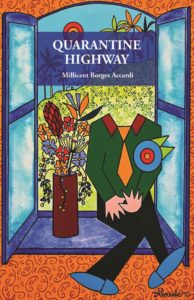 Review by Barbara Ellen Sorensen
Review by Barbara Ellen Sorensen
Millicent Borges Accardi’s Quarantine Highway is an exploration of human beings finding new ways to be together in the midst of a pandemic. Her poems encompass relationships as well as separations and borders, and what we have found out about ourselves. In Accardi’s superb poetic voice, she invites the reader to reflect on what it means to be together while simultaneously being apart from others.
Much like a highway, the poems invariably direct us toward something. Whether that something is positive or not, is entirely up to all of us. But the warning is there: if we travel away from one another and we are not ready to forgive, love will elude us: “The faithful-infinite, unspeakable silence/dwells in the house of never forgiving.” (78)
The poet recognizes the urgency of the COVID pandemic as a way through the barriers we have erected around ourselves, and the borders we have relished, mistakenly. The illness morphs into a metaphor where readers must see each other as human beings even as they navigate around broad cultural differences.
There is the recognition that this has always been a country of many languages, sexual identities and orientations, ethnicities, creeds and spiritual beliefs. Accardi is Portuguese American so it is fitting that she uses poetic lines from other Hispanic poets as cues. There are poems that are prompted from every country that resides within the Spanish diaspora from the Americas, Africa, Europe, as well as from the LGBTQ+ community. Precisely because we are all traveling down this crumbling highway we need to meet each other at least halfway and recognize how fragile our social constructs really are: “Our weird/worldly support system gone, all,/within six feet of/ social distance and water droplets.” (9)
The highway is much like the virus; it can divide us if we allow it to. It can become an entangled web of misconceptions. Accardi’s poems capture the cultural moment and illuminate the need for a new set of rules for our assumptions that a mutual love between human beings is always at our fingertips. The notion that all will be well is simply a perfunctory state of mind. Love and joy cannot always save us, she writes in Broken Pieces: “The empirical /wish of a stupid requirement for happiness.” (3) But love is, nevertheless, a necessity: “Love is not a currency, neither is it an assignment./ … How can you not know/how to break through and touch me? Isn’t love/like drinking water for thirst …” (14)
There are no separate chapters, sections or any other defining delineations between the poems; they are arranged as one long continuum, like one long highway. We are all headed to a tenuous future, one that the reader and the poet herself hopes will not exist forever, one that we will not have to rewrite or erase in order to love each other: “Inside the tunnel that is where/we used to travel through on our/way to being together.” (11)
Quarantine Highway by Millicent Borges Accardi
FlowerSong Press, 2022 [paper]
ISBN: 978-1-953447-35-7. 93pp
Barbara Ellen Sorensen is former senior editor of the American Indian Science & Engineering Society’s flagship publication, Winds of Change. Sorensen is a contributing writer to the Tribal College Journal. Sorensen has had three books of poetry published: Songs from the Deep Middle Brain (Main Street Rag, 2010), Compositions of the Dead Playing Flutes (Able Muse Press, 2013), and Mary’s River (Kelsay Books, 2018). Her first book was nominated in 2011 for a Colorado Book award.
